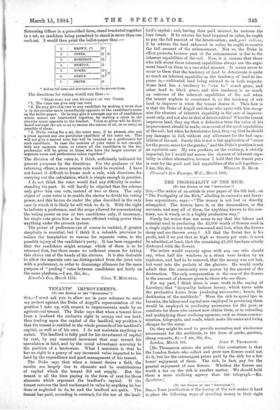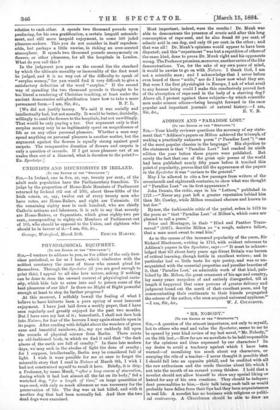[To THE EDITOR OF THE "SPECTATOR."]
SIB,—Your justification of the luxury of the rich makes it hard to place the following ways of spending motley in their right relation to each other. A spends two thousand pounds upon producing, for his own gratification, a certain languid astonish- ment, and still more languid enjoyment, in some 500 jaded pleasure-seekers. This you do not consider in itself reprehen- sible, but perhaps a little unwise, in risking an over-scented atmosphere. B spends two thousand pounds anonymously on flowers, or other pleasures, for all the hospitals in London. What do you call this P.
In the judgment you pass on the second lies the standard by which the ultimate morality or immorality of the first must be judged, and it is no way out of the difficulty to speak of "surplus money," for you would find it very difficult to give a satisfactory definition of the word "surplus." If the second way of spending the two thousand pounds is thought to be too literal a rendering of Christian teaching, at least under the ancient democracies self-glorification knew how to take a more permanent form.—I am, Sir, &c., B. P. L.
We did not justify luxury. We said it was socially and intellectually bad, but not morally. It would be better, decidedly, willingly to send the flowers tcr the hospitals, but not unwillingly. That would be only paying a tax. Our argument only is that surplus money may be as legitimately spent on magnificence of life as on any other personal pleasure. Whether a man may spend anything on personal pleasure is another matter, but the argument against the flowers is equally strong against good carpets. The comparative duration of flowers and carpets is only a question of seconds. If I get more pleasure out of an azalea than out of a diamond, what is duration to the point?— En. Spectator.]



































 Previous page
Previous page